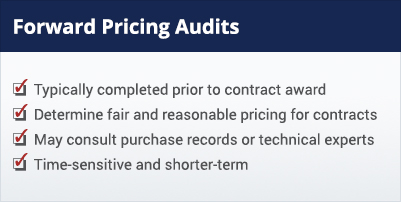Fort Belvoir, VA –
Forward Pricing audits are another common audit DCAA employees complete. Read on to get an overview of what they are and why it’s important DCAA executes them for government contractors.
Purpose:
Forward pricing audits are used to ensure costs in a contractor’s proposal are fair, reasonable, and comply with all federal regulations. DCAA will evaluate the proposed cost estimate for the goods or services that are to be provided to the government. Accurate proposal prices are also important to ensure the government obtains fair and reasonable prices throughout the duration of the contract, because subsequent costs are often based on the initial estimate.
cost estimate for the goods or services that are to be provided to the government. Accurate proposal prices are also important to ensure the government obtains fair and reasonable prices throughout the duration of the contract, because subsequent costs are often based on the initial estimate.
Timeline:
Forward pricing audits are time sensitive, DCAA is typically required to complete the audit within 45-60 days. They have a shorter turn-around time because they must be completed before any contract negotiations are conducted.
Typical Activities Can Include Evaluating:
- Labor hours - Determining if the proposed direct labor hours are classified appropriately. Auditors may apply quantitative method techniques such as improvement curves or regression analysis.
- Labor rates - Reviewing the proposed base labor rates to ensure they are reasonable for the labor market. Auditors may review market rates, survey data, prior compensation rates, or public wage records.
- Indirect rates - Verifying that rates comply with Cost Accounting Standards (CAS) and federal regulations. Auditors may examine the contractor’s budgetary data and forecasted business base, or perform regression analysis.
- Materials - Determining if the proposed prices, kinds, and quantity of materials proposed are reasonable. Auditors may review current vendor quotes and purchase history, compare the kinds and quantities to engineering drawings or the Request for Proposal (RFP), or obtain expert technical assistance.
Interested in learning more about DCAA audits? See our blogs on Understanding DCAA Audits or Incurred Cost Audits, or review other articles on the DCAA Career Blog.